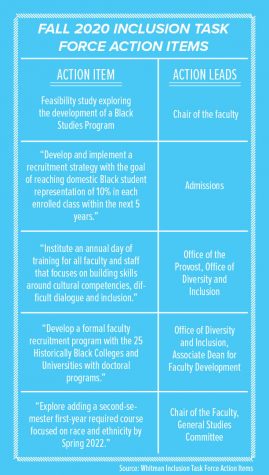Whitman considers language requirement
December 3, 2019
Students and faculty have recently been grappling with the question of whether there should be a language requirement at Whitman. Currently, Whitman does not have a language requirement. Rather, the college requires a cultural pluralism course for distribution, which language courses may fall under. In February of 2020, Whitman will decide on a new general education package that may have a language requirement.
Many of Whitman’s peer schools do have a language requirement. The University of Puget Sound’s website reads, “all students are required before graduation to demonstrate college-level knowledge of a classical or modern foreign language.” This means students can take a test to pass a certain level of proficiency in a language or they can take courses in a foreign language.
One of the general education requirements at Lewis & Clark College for the Bachelor of Arts degree is three semesters of a single foreign language.
Students have been considering the impact of Whitman adding a language requirement.
Junior Camille Marshall shares her thoughts on this subject.
“The system already encourages you to take a language if you want because it covers distribution requirements under cultural pluralism and humanities,” Marshall said.
According to Marshall, having a requirement that makes students take a language puts added stress on their class load.
“If you have a major that has a high course load, then the added language requirement limits extra classes you can take for interest,” Marshall said. Marshall is a Biology major and Chemistry minor and is simultaneously trying to acquire pre-med requirements.
Whitman Professor of Mathematics and Faculty Chair Barry Balof notes that one of the biggest concerns for the faculty is how not to overload students with course requirements.
“Our overall goal is to craft more intentional categories and outcomes from a Whitman general education, while not asking any more in terms of coursework devoted to General Education (which is about 1/3 of the student’s curriculum) than we do now,” Balof said.
Marshall also brings up the point that having a language requirement will mean students who have no background in a foreign language will have to start fresh.
“If someone starts a new language at Whitman, courses they take will get through verbs and nouns. You won’t be able to learn the language and become fluent,” Marshall said. “It makes me question what the point is of having a language requirement in the first place.”
According to Balof, it is important that students have a stronger sense of why they are taking the courses outside of their major and can develop connections between courses.
“A well-articulated requirement around the study-of language can help with that goal,” Balof said.
Balof says that one overall goal for Whitman graduates is to be able to engage across cultures and barriers.
“This is an important skill for Whitman graduates, whether that comes in the form of understanding about difference, or through direct communication,” Balof said.
Balof sees both merits and challenges to a language requirement.
“As faculty Chair, my role is to allow space for a fair and inclusive conversation on the subject,” Balof said.
Discourse on the language requirement proposal continues, and it is important for students to share any opinions on why this would affect them. The faculty, who have control over the facets of the curriculum, are open to feedback from students and the administration.
“Discussions have been at special all-faculty sessions, as well as within departments. We also had a student forum on Wednesday, November 13,” Balof said. “The discussions are facilitated by myself and other members of the General Education Working Group, which consists of faculty, staff and administration.”






